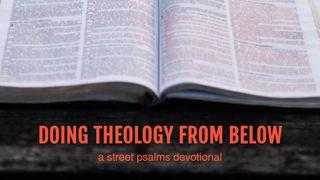Deuteronomy: At Journey's Endਨਮੂਨਾ

Facing life
The message of the Song of Moses is in the whole sweep of its poetry. He is seeking to make Israel face the meaning of their history and national experiences. So here we will not pick out particular truths, but try to ‘take a stroll’ through the first half of the song.
The appeal to listen in 32:1–2 is based, first, on who their God is (vv. 3–4) and then on their sad response (vv. 5–6). As ‘Rock’ he is steadfast and unchanging – especially in moral quality (v. 4b) but also in saving provision (Ex. 17:6), hence the Father who made you what you are (Deut. 32:6).
In the next section a retrospect starts with the organisation of the world around Israel (vv. 7–9). This is the meaning of ‘according to the number of the sons of Israel’ (v. 8). In appointing the nations their places, the Lord did so bearing in mind what his people, in their envisaged population, would need. In a word, they are central to his world rule, but also are the objects of his tender care (vv. 10–13). God found and safeguarded (v. 10), protected (v. 11), guided (v. 12) and settled Israel in their own land (vv. 13–14), with supernatural (v. 13) and natural (v. 14) provision.
But in verses 15–18, Israel’s sad reaction of verse 5, in relation to what the Lord is known to be, is repeated – though in the face of the history of God’s gracious dealing with them (vv. 7–14). The perils of prosperity (v. 15) led to disloyalty and provoking idolatry (vv. 16–17), with sinful forgetfulness (v. 18).
Now we see the Lord’s reaction (vv. 19–22). He becomes jealous and angry (vv. 19–21a). The New Testament tells us that the means of provoking Israel to jealousy (v. 21) is the extension of the Gospel to Gentiles and their worldwide response to the offer of grace (Rom. 11:11–14). This suits the meaning here, of course, and prepares us for the message of world judgment in Deuteronomy 32:22, the assumption being (as is the case) that in every place the deepest divine anger would follow any rejection of the gospel message.
The final section today (vv. 23–27) notes the adversity that is inseparable from flouting the Lord’s grace: divine alienation (v. 23), dislocation of the order of creation (v. 24), historical disaster (v. 25) but also divine forbearance prompted by anxiety lest his divine rule and prerogative be misunderstood and denied (v. 27).
Reflection
Romans 11:17–22 urges on us the task of making sure of our standing in the work of salvation (cf. 2 Peter 1:10).
ਪਵਿੱਤਰ ਸ਼ਾਸਤਰ
About this Plan

In these daily undated devotions, Alec Motyer explores the timeless truths of Deuteronomy and applies them to our lives today. Just as the Israelites did, we can appreciate the wonder of God’s grace to us through repentance, experience His committed love for us, and learn more about walking in His ways.
More









